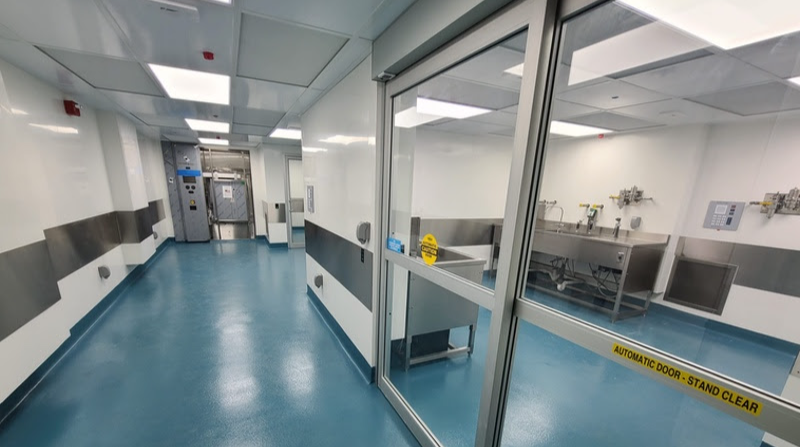The high demand for cleanrooms has continued to surge throughout a global pandemic. In these time-sensitive conditions many companies are moving away from traditional building techniques. Alfonso Traina from Modular Devices Inc (MDI) explains:
Have you ever received the momentous assignment from your organization to design and build a new state-of-the-art cleanroom for a product or products that are likely the backbone of your company’s profitability? This is an enormous undertaking even if you are the head of your company’s facilities or engineering department, let alone if you are an end user, or a scientist who is mainly interested in working in the completed and properly functioning cleanroom.
Regardless of your position, the assignment may very quickly start to look like an impossible and overwhelming undertaking. The cleanroom design and the eventual build-out of that design requires expertise in that field no matter how many construction projects you may have been a part of.
Combine that with a broken global supply chain, insane lead-times, constantly increasing material costs, and the overall timeline for conventional construction; more and more companies are concentrating their efforts and their capital on turnkey, prefabricated cleanroom providers.
The high demand for cleanrooms has continued to surge even throughout the ongoing global public health pandemic, and during this surge a new way of building cleanrooms has really started to flourish. Whether your company is looking to build a new cleanroom, renovate an existing space, or if you are just out of room inside your existing facility, Mobile Cleanrooms (MCRs) are a fast, reliable, and fully compliant solution for any industry or application.
For decades, the cleanroom industry has relied upon companies that provide a traditional design-build construction process. This process begins with developing an engineering and design package through an architectural and engineering firm. After the design and formal drawings have been completed, which can take several months to over 12 months in some instances, the client then must hire a general contractor to gather bids for the project, then award the project, and finally, to build the overall project.
This means pulling together multiple disciplines and trades to satisfy the overall construction requirements all the way through commissioning, validation, and certification of the cleanroom.
This can quickly lead to an overpriced cleanroom project, and many times a group of designers and contractors that have never worked together, and even more often, a group of contractors that have never been involved with a cleanroom project before. These issues can compound during the project leading to delays, change-orders, and a deficient or inoperative cleanroom at completion.
MCRs offer tremendous flexibility during the design-phase, and the overall fabrication of a turnkey prefabricated cleanroom that is ready for use, can many times be completed and ready for delivery in just a few months. This all while avoiding the common pitfalls, unknowns, and the unpredictable timeline of conventional construction, or even modular onsite assembly. Things like houses, vehicles, and airplanes are quite often constructed in a modular method. Rather than being put together all at once, they are built in separate parts that get assembled into a finished product.
When it comes to modular cleanrooms, while they are typically assembled out of prefabricated components, and installed more efficiently at the final site than with a traditional construction process, they still must be assembled at the final installation location. MCR’s offer an approach that combines the modular and prefabricated approach by delivering a ready-to-use, turnkey cleanroom that only requires utility connections upon being delivered.
Everything else that would normally be assembled at the final installation site is prefabricated and preassembled using modular components which makes for a completely seamless and expedited cleanroom project.
These mobile solutions still offer the full customisation that clients are accustomed to when following the traditional design-build process.
MCR firms can simplify what can often be a very complicated construction process by offering a one-stop-shop for your design, fabrication, delivery, setup, commissioning, and a cleanroom that is ready for validation and certification upon arrival.
These increasingly popular companies that are offering this new-age approach for cleanrooms have all the required expertise under one roof. This includes architects, engineers, construction disciplines, and cleanroom experts that can guide you through the entire project.
By avoiding the less than desirable steps and limitations of the standard design-build construction process that were described earlier in this article, MCR firms can provide a highly efficient project that produces state-of-the-art cleanrooms without sacrificing unnecessary time and capital.
MCR firms can control cost, lead-times, and the overall project timeline due to having everything fabricated under one roof at a factory or manufacturing facility.
These firms are also able to fully test and pre-certify the cleanroom prior to the client taking delivery. This removes one of the biggest risks with a stick-build, modular-build, or traditional cleanroom construction project, which is will the cleanroom function properly and meet all required specifications and requirements when it is completed.
Mobile Cleanrooms can be utilized in all industries where controlled environments are required, including but not limited to pharmaceutical, cellular & gene therapy, tissue processing, semiconductor, biopharmaceutical, nanotechnology, medical device, biochemical, and manufacturing.
A common misconception with Mobile Cleanrooms is that they can only be applied to smaller projects that do not require a lot of space for the overall cleanroom footprint. However, Mobile Cleanrooms can be expanded and connected to create entire facilities that can sit inside of an existing building, or be placed outside of a building, and then connected to that building if needed.
As markets like stem cell biomanufacturing continue their rapid growth, it is highly probable that MCRs will become the logical solution for continuous and uncomplicated expansion.
When these types of companies continue to develop new products and as they grow their business, it seems that Mobile Cleanrooms may quickly become the way of the future.
By offering a turnkey “Lego-like” approach for cleanroom installations and expansion that can provide clients with upfront all-in pricing, less disruption, state-of-the-art technology, and a fast-tracked cleanroom project, this innovative approach may be exactly what you and your organisation have been looking for.






